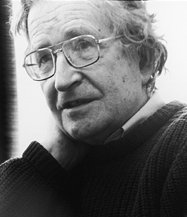Noam Chomsky
Avram Noam Chomsky (gebore 7 Desember 1928) is 'n Amerikaanse taalkundige, filosoof,[1][2] kognitiewe wetenskaplike, logikus,[3][4][5] politieke kommentator, sosiale aktivis, voorstander van anargo-sindikalisme,[6] skrywer en dosent. Chomsky is 'n emeritus hoogleraar in taalkunde aan die Massachusetts Institute of Technology (MIT). Hy het al meer as 100 boeke geskryf en word soms die "vader van moderne taalkunde" genoem.[7][8] Hy is ook 'n prominente kulturele figuur en is in 2005 as die "wêreld se top openbare intellektueel" aangewys.[9]
Noam Chomsky | |
|---|---|
 Noam Chomsky in 2004 | |
| Gebore | Avram Noam Chomsky 7 Desember 1928 |
| Nasionaliteit | Verenigde State van Amerika |
| Beroep | Akademikus |
| Bekend vir | Akademiese prestasies, politieke aktivis, anargis |
| Titel | Professor |
Linguistiek
wysigChomsky het die teorie van generatiewe grammatika geskep. Dit is een van die belangrikste bydraes tot die veld van linguistiek in die 20ste eeu. Hy het ook gehelp met die kognitiewe rewolusie in sielkunde deur sy hersiening van B. F. Skinner se Verbal Behavior (Verbale Gedrag).[10] Hy bevraagteken die gedragtelike manier om na optrede en taal te kyk. Dit was die belangrikste benadering in die 1950's. Sy natuurlike benadering tot die studie van taal het die filosofie van taal en gees verander. Hy het ook die Chomsky-hiërargie bedink, 'n manier om na formele tale te kyk in terme van hul vermoeë om taal te verduidelik.
Politiek
wysigIn die 1960's het Chomsky die Viëtnamoorlog gekritiseer. As gevolg hiervan het hy vir sy politieke standpunte bekend geword. Hy word as 'n belangrike intellektuele figuur binne die linkse geledere van die Amerikaanse politiek beskou. Chomsky is wyd bekend vir sy politieke aktivisme en sy kritiek teen die buitelandse beleide van die Verenigde State van Amerika en ander regerings. Chomsky verwys na homself as 'n sosialistiese liberalis en 'n anargis, en het omvattend oor die onderwerpe geskryf. Hy is 'n lid van die Industrial Workers of the World, en volg in die voetspore van sy vader, William Chomsky, wat ook 'n lid was.[11]
Sien ook
wysigVerwysings
wysig- ↑ "Noam Chomsky" Geargiveer 13 Februarie 2015 op Wayback Machine, deur Zoltán Gendler Szabó, in Dictionary of Modern American Philosophers, 1860–1960, red. Ernest Lepore (2004). "Chomsky's intellectual life had been divided between his work in linguistics and his political activism, philosophy coming as a distant third. Nonetheless, his influence among analytic philosophers has been enormous because of three factors. First, Chomsky contributed substantially to a major methodological shift in the human sciences, turning away from the prevailing empiricism of the middle of the twentieth century: behaviorism in psychology, structuralism in linguistics and positivism in philosophy. Second, his groundbreaking books on syntax (Chomsky (1957, 1965)) laid a conceptual foundation for a new, cognitivist approach to linguistics and provided philosophers with a new framework for thinking about human language and the mind. And finally, he has persistently defended his views against all takers, engaging in important debates with many of the major figures in analytic philosophy..."
- ↑ The Cambridge Dictionary of Philosophy (1999), "Chomsky, Noam," Cambridge University Press, bl. 138. "Chomsky, Noam (born 1928), preeminent American linguist, philosopher, and political activist... Many of Chomsky's most significant contributions to philosophy, such as his influential rejection of behaviorism... stem from his elaborations and defenses of the above consequences..."
- ↑ Edwin D. Reilly (2003). Milestones in Computer Science and Information Technology. Greenwood Publishing Group. pp. 43–44. ISBN 978-1-57356-521-9.
In 1956, the logician Noam Chomsky showed that there are only four basically different forms Church-Turing thesis of grammar, which, in decreasing order of sophistication, he called grammars of Type 0, 1, 2, and 3.
. - ↑ H. L. Somers (2003). Nirenburg, Sergei; Somers, H.L.; Wilks, Yorick (reds.). Readings in Machine Translation. MIT Press. p. 68. ISBN 978-0-262-14074-4.
I think that this should be of sufficient interest to warrant some more detailed exhibition, especially since this insight is due to an important new, not to say revolutionary, view of the structure of language, recently outlined by the American linguist and logician Noam Chomsky [2], and could perhaps, in its turn and in due time, be turned into a new method of machine translation, which would be more complex than the known ones but also more effective.
. - ↑ Otero, Carlos Peregrín, red. (1994). Noam Chomsky: Critical Assessments, Volume 1; Volume 3. Taylor & Francis. pp. 14–15. ISBN 978-0-415-10693-1.
Chomsky is a professional linguist, a competent mathematical logician, and a trained methodologist with a keen critical sense and an uncanny ability to follow the most abstruse mathematical argument or, if necessary, to produce one himself.
- ↑ Posner 2003, p. 86: "Chomsky is not a communist and does not admire any of the communist regimes."
- ↑ Fox, Margalit (5 Desember 1998). "A Changed Noam Chomsky Simplifies" (in Engels). New York Times. Geargiveer vanaf die oorspronklike op 20 Julie 2019. Besoek op 7 Oktober 2014.
Mr. Chomsky...is the father of modern linguistics and remains the field's most influential practitioner.
- ↑ Thomas Tymoczko, Jim Henle, James M. Henle, Sweet Reason: A Field Guide to Modern Logic, Birkhäuser, 2000, p. 101.
- ↑ Duncan Campbell (18 Oktober 2005). "Chomsky is voted world's top public intellectual | World news" (in Engels). The Guardian. Geargiveer vanaf die oorspronklike op 15 Junie 2013. Besoek op 29 Mei 2013.
- ↑ Verbal behavior, 1957, ISBN 1-58390-021-7
- ↑ Stirner, Max (1 April 2012). "Noam Chomsky & Workers' Control" (PDF). Sparks. p. 22. Besoek op 18 Desember 2012.
Eksterne skakels
wysig- Amptelike webtuiste
- Wikimedia Commons het meer media in die kategorie Noam Chomsky.